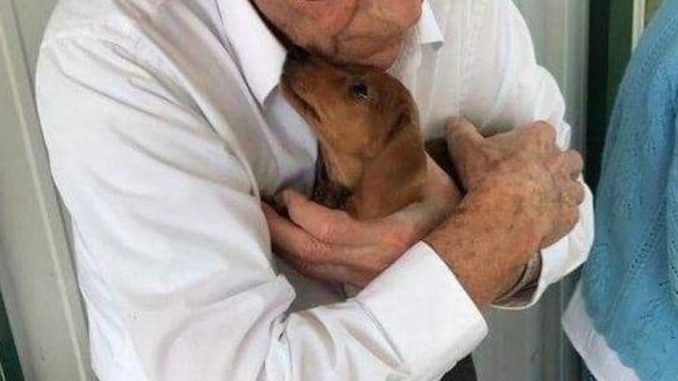
Whenever I visited my grandfather, he preferred solitude and often pushed people away. Wanting to change that, I introduced him to a little dog I had rescued off the street. He named the dog Chirulin, and the two quickly formed a close bond. They spent their days together sunbathing, eating, walking, and watching TV.
Recently, when my grandfather became ill and was hospitalized, he wrote me a letter with instructions on how to care for Chirulin if he didn’t recover. He even included his special soup recipe for the dog. At that moment, all I wanted was for him to write me a recipe on how to live without him. He entrusted Chirulin to our family’s care. After he left the hospital, we brought Chirulin to see him. My grandfather hugged the dog tightly and said with a laugh, “We need to hurry and do all the things we’ve left undone; time is short.” He had even made a list of activities he wanted to share with Chirulin.
Their love for each other was clear. For those who say pets are “just animals,” I would say: “Animals are a gift to the soul. They teach us tolerance, respect, and love—the kind that connects rather than divides. Loving them teaches us how to truly love.”
The next day, my grandfather wore his old leather hat and called Chirulin over, tail wagging excitedly. “Alright, boy,” he said, slipping a crumpled paper into his pocket, “let’s make the most of our time.”
The list was simple but meaningful. First, they visited the town bakery where he used to buy bread each morning before withdrawing from the world. The shopkeeper, an old friend, was surprised to see him. “Look who finally came out of his cave!” she joked, handing him a warm loaf. Grandpa chuckled, breaking some off for Chirulin and taking a bite himself. “It’s been too long,” he said.
Next was feeding the ducks at the park. Sitting by the pond, tossing crumbs, Grandpa said softly, “You know, I forgot how peaceful this is. When you get old, you think life has nothing left for you—but it always does.”
Over the following weeks, Grandpa and Chirulin checked off more activities. They visited the seaside, where he let the waves touch his feet while Chirulin barked at seagulls. They spent quiet afternoons on the porch, and even went to a dance hall where Grandpa danced with a woman who had admired him for years.
But his strength began to fade. Walks became shorter. One night, as Chirulin lay beside him, Grandpa sighed, “I think I’ve done all I wanted—except one last thing.”
He gave me a small box, fingers trembling. “Open it when the time is right,” he said.
Two weeks later, he passed away peacefully in his sleep, with Chirulin by his side.
In my grief, I remembered the box. Inside was a letter addressed to me:
“My dear, if you’re reading this, I’ve gone ahead. Don’t be sad too long; life is for living, not mourning. I leave you my greatest treasures—memories, love, and Chirulin.
Here’s my recipe for living without me:
Love deeply, even when it hurts.
Laugh often, laughter is your shield.
Forgive yourself, others, and life.
Take walks—alone or with a friend or dog.
Be kind; everyone fights silent battles.
Don’t fear goodbyes; they mean ‘I’ll see you again in another form.’
Live well, and take care of Chirulin.
With all my love, Grandpa.”
Tears blurred my eyes, but I smiled. The sadness would stay, but so would the love.
Chirulin nudged my leg, looking up with knowing eyes. “Alright, buddy,” I said, stroking his fur, “let’s go for a walk.”
Because life, as Grandpa showed me, is meant to be lived.
Leave a Reply